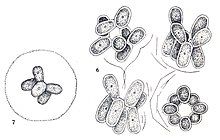Schroederiella
| Schroederiella | |
|---|---|

| |
| Schroederiella africana | |
| Scientific classification | |
| Clade: | Viridiplantae |
| Division: | Chlorophyta |
| Class: | Chlorophyceae |
| Order: | Sphaeropleales |
| Family: | Scenedesmaceae |
| Genus: | Schroederiella Wołoszyńska |
| Type species | |
| Schroederiella africana Wołoszyńska[1]
| |
| Species | |
| |
Schroederiella is a genus of green algae in the family Scenedesmaceae.[2]
The genus was circumscribed by Jadwiga Wołoszyńska in Hedwigia vol.55 on pages 198, 210, 223 in 1914.
The genus name of Schroederiella is in honour of Ludwig Julius Bruno Schröder (1867–1928), who was a German teacher, botanist (Algology and Bryology), also Hydrobiologist and Zoologist. He worked as a deputy head teacher in Breslau.[3]
Description
[edit]Schroederiella consists of colonies (called coenobia) of eight (sometimes four) cells. The cells are arranged alternately in a ring shape, and are attached to each other near their poles. Cells are ellipsoid or elongately ellipsoid, 7 to 18 μm long and 5 to 9 μm wide, and are uninucleate with one chloroplast and pyrenoid.[1]
Schroederiella reproduces asexually via the formation of autospores. Four or eight autospores are organized into the shape of a coenobium; they are released from a tear the mother cell wall.[1]
Species
[edit]- Schroederiella papillata Korshikov, 1953
- Schroederiella africana Wołoszyńska, 1914
References
[edit]- ^ a b c Guiry, M.D.; Guiry, G.M. "Schroederiella". AlgaeBase. World-wide electronic publication, National University of Ireland, Galway. Retrieved 2023-11-30.
- ^ See the NCBI webpage on Schroederiella. Data extracted from the "NCBI taxonomy resources". National Center for Biotechnology Information. Retrieved 2007-03-19.
- ^ Burkhardt, Lotte (2022). Eine Enzyklopädie zu eponymischen Pflanzennamen [Encyclopedia of eponymic plant names] (pdf) (in German). Berlin: Botanic Garden and Botanical Museum, Freie Universität Berlin. doi:10.3372/epolist2022. ISBN 978-3-946292-41-8. Retrieved January 27, 2022.
- ^ "Schroederiella Woloszynska, 1914". www.marinespecies.org. WoRMS - World Register of Marine Species. Retrieved 20 October 2022.
